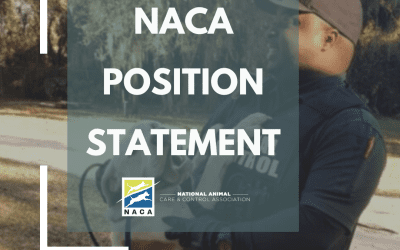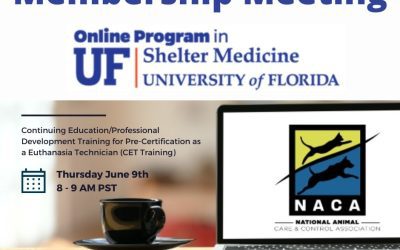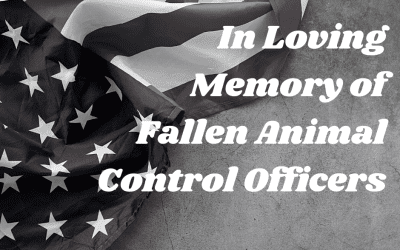NACA Statement on Recognizing the Role of the Animal Control Officer NACA recommends animal control officers receive compensation, training, resources, and equipment necessary to perform the critical services they provide to their communities. More specifically, NACA...
Blog
NACA endorses New Federal Act for Animals in Disasters!
As disaster season gets more extreme each year and affects millions of people and their pets, NACA wanted to share with all our members an important piece of legislation we are endorsing. We want to make sure all our members were aware of this important federal...
Deputy Angela Walters – NACA’s June Humane Highlight
Deputy Angela WaltersCheboygan County Michigan Deputy Angela Walters is currently one of two deputy Animal Control Officers for Cheboygan County Michigan. Deputy Walters has a bachelor’s degree in Criminal Justice from Lake Superior State University and has been...
NACA Statement on the Potential for Expansion of Courtroom Animal Advocates Program (CAAP) Laws
Dear colleagues,
NACA wants to thank you for continuing to go above and beyond every day for the animals and people in your communities. At our very core, NACA envisions a world in which all animal care and control professionals are respected as essential public servants and receive consistent support, resources and training allowing them to effectively and compassionately achieve the highest quality of life for the animals and citizens in the community they serve. Please read below for our most current position statement in response to the potential for expansion of Courtroom Animal Advocates Program (CAAP) Laws.
ACO 1 or ACO 2 Course Scholarships
NACA (National Animal Care and Control Association) has been awarded a grant from the ASPCA® (The American Society for the Prevention of Cruelty to Animals®) to help fund a scholarship program through which NACA will award scholarships for ACO 1 or ACO 2 courses,...
June 9th 2022 – NACA Meeting
Thursday, June 09, 2022 8:00 AM - 9:00 AM PDT Membership is invited to join the monthly NACA Board Meeting Every 2nd Thursday public meeting Log into your member portal for the zoom link on the calendar.
NACA Appointment-based Intake Question and Answer
Q: Why did NACA write and share this statement?
A: We know that many pets who enter shelters could have been helped in other ways – through pet support services, proactive return-to-home programs, TNR/SNR, etc. Reducing shelter intake by helping solve pet-related problems is good for communities and is the most responsible use of taxpayer funding. In addition, if more pets can be served in their homes and neighborhoods, the animal shelter can provide better care and outcomes for the pets who truly do need to enter the shelter. The result of appointment-based intake should be better service to pets and people in your community. This statement was created to support public shelters in implementing these practices and inform policymakers about the benefits.
Humane Highlight – Chris Meyer
Chris Meyer Charlotte-Mecklenburg Police Department Animal Care & Control Division Chris is an enforcement Officer for Charlotte-Mecklenburg Police Department Animal Care & Control Division. He has been in this position for two years. During this period, he...
Fallen Animal Control Officer Memorial
National Animal Care & Control Association (NACA) and Code 3 Associates are proud to announce the re-unveiling of the Fallen Animal Control Officer Memorial. NACA built the memorial to honor Animal Control Officers that were killed in the line of duty. Since...
April 2022 NACA Humane Highlight!
Sam Torres St. Clair County Animal Control This month NACA is proud to feature member Sam Torres! Sam started volunteering at St. Clair County Animal Control when she first moved to Michigan. She immediately fell in love with the animals, though she is a dog person...





